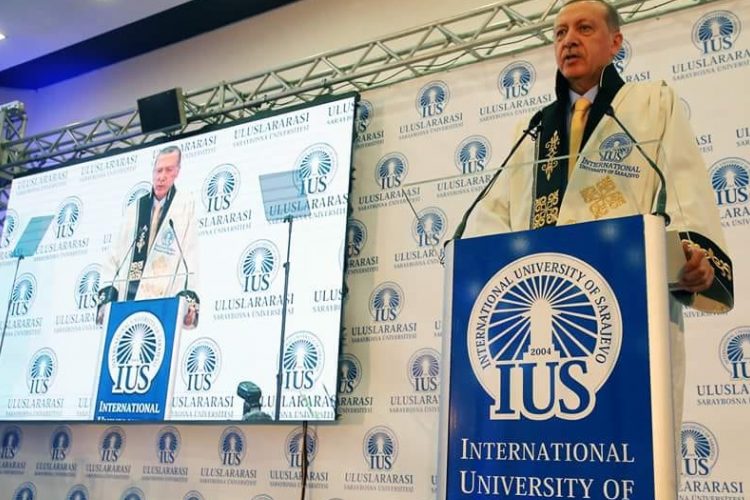Levent Kenez
The International University of Sarajevo, which was founded by an Islamist foundation supported by Turkish President Recep Tayyip Erdoğan and his family, has conducted a controversial political survey on its Bosnian students and employees concerning an enemy of Erdoğan, according to a document obtained by Nordic Monitor.
Coordinated by the Student Administration Office, the survey includes questions about a controversial coup attempt in Turkey on July 15, 2016 and the faith-based Gülen movement, a vocal critic of the Erdoğan government that is accused of orchestrating the failed coup, although it strongly denies any involvement. It is noteworthy that “Bosnian Citizens” in Turkish appears at the top of the questionnaire. Nordic Monitor has learned that participation in the survey was mandatory for employees, even for companies doing business with the university.
Despite the fact that the survey aims to give an impression of objectivity by including some arguments challenging the Turkish government narrative of the Gülen movement and the coup attempt, it is easy to see the leading nature of the poll since it prioritizes official statements.
Asked “How you define the Gülen movement?” the respondent must choose one of the following: armed terrorist organization, terrorist organization, organized crime organization, cult, spy ring, religious community, civil society organization, no idea or other (“Please indicate”).
A similar question is asked with different wording: “How you define Fethullah Gülen [the spiritual leader of the Gülen movement]? Leader of a terrorist organization, leader of an organized crime organization, a religious leader, mafia leader, philanthropist, foreign intelligence operative.
In another question, the person surveyed is asked about his or her source of information about the Turkish government’s fight against the Gülen movement. The question does not explain what is meant by the “fight.” The Turkish government has thus far jailed thousands of Gülen followers and dismissed about 150,000 civil servants from their jobs. Numerous international observers have reported severe human rights violations including enforced disappearances and torture inflicted on members of the movement.
When asked who was behind the July 15 coup attempt, the respondent must choose among various options, the first of which is the Gülen movement, which has repeatedly denied any involvement in the abortive putsch.
In the final part of the questionnaire, the respondent is asked to comment on widely recycled arguments that are often used in the defamation of the Gülen movement.
Neither the purpose of the survey nor its author is disclosed. Nordic Monitor has learned that the Student Administration Office has declined to elaborate on whether it is part of an academic study. One employee who spoke on condition of anonymity said, “It’s absurd to say that someone who works at a Turkish government university can fill out this form honestly.” It is uncertain how the university or the surveyor will make use of the poll, which is apparently unreliable and non-academic.
The International University of Sarajevo was established by the Foundation for Education Development Sarajevo (SEDEF) in 2004. The members of the foundation are pro-government businessmen and representatives of Islamist foundations backed by the Turkish government. For instance, Islamist foundation İlim Yayma Vakfı, whose vice president is Bilal Erdoğan, the son of President Erdoğan, is one of the founders.
On October 16 Bilal Erdoğan was a guest lecturer at the university, speaking to students along with Bakir Izetbegovic, then-chairman of the House of Peoples of Bosnia and Herzegovina (one of two chambers in the Bosnian parliament) and a close friend of the Erdoğan family. Bilal was introduced as the “acting chair of the İlim Yayma Foundation,” which was kept quiet in Turkey given the fact that the foundation already has a president.

Most recently, Sevgi Kurtulmuş, the wife of Numan Kurtulmuş, a deputy chairman of Turkey’s governing Justice and Development Party (AKP), was appointed head of the board of trustees, the governing body of the university. Sevgi Kurtulmuş was previously appointed vice rector of Ankara’s Social Sciences University, originally known as İpek University, which was seized by the government following the coup attempt. It is unknown whether Sevgi Kurtulmuş has left her post in Ankara since her name still appears as vice rector on the university’s website. It is common in Turkey for pro-AKP bureaucrats and academics to have multiple sources of income, serving as board members at state-owned companies or institutions. Ironically, Numan Kurtulmuş had called Erdoğan a corrupt leader and likened him to Croesus before dissolving his own party to join Erdoğan’s government.

Turkey’s expansionist agenda fueled by religious and historical themes has antagonized the already polarized Bosnia, which consists of multiethnic groups. A media owner told Nordic Monitor that “since Turkish state-owned and pro-Erdoğan companies operating in Bosnia are top advertisers in the small media market, criticism is not openly voiced. However, we are aware that Erdoğan’s Turkey is not a country we envy. Bosnia’s future lies in the EU, and a close relationship with Erdoğan is an obstacle to that.”
Another source told Nordic Monitor that the Bosnian government does not interfere in Erdoğan’s dealings in the country since Turkey has bribed the Bosnians with the promise of important construction and restoration projects.
Meanwhile, in July a group of prominent Bosnians including journalists, artists, academics and writers issued a statement amid Turkey’s pressure on Bosnia for the deportation of its critics to Turkey, saying, “Bosnia and Herzegovina is no longer a paşalık [an administrative unit in the Ottoman Empire] in which orders from Istanbul are strictly enforced.”












